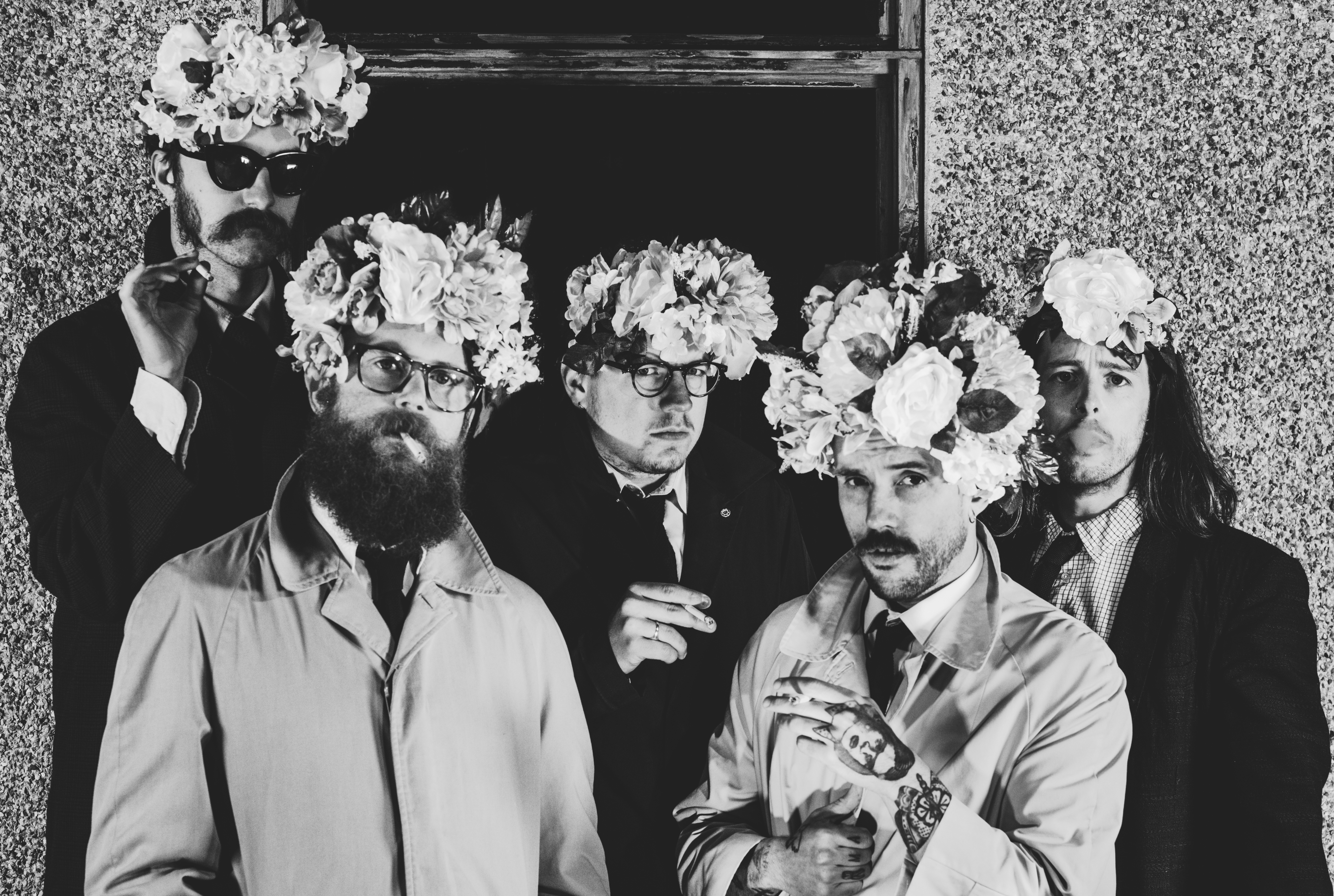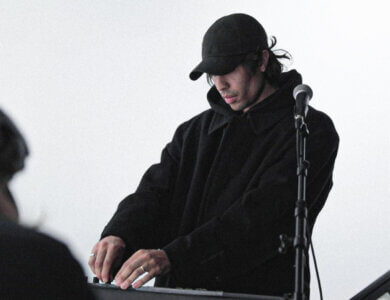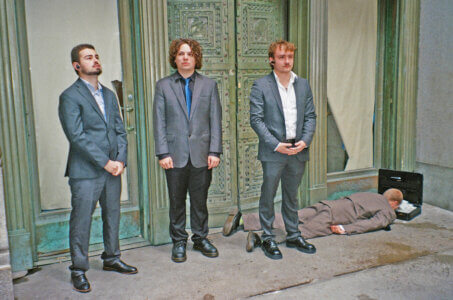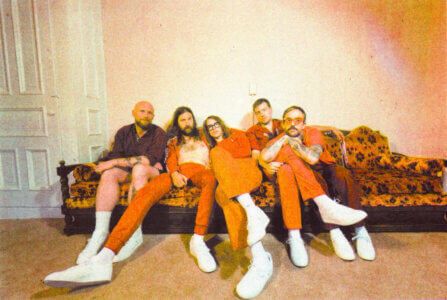Idles Work Through Their Pain

Idles are one of those rare bands where the story behind the music is often just as compelling and heartbreaking as the songs. Through all their troubles however Idles has continued to put out great and emotionally raw music, most recently in the shape of their new album Joy As An Act Of Resistance. We caught up with Idles singer Joe Talbot in the midst of Idles’ latest North American tour to talk about their new album, sobriety and how masculinity is the root for many issues facing the world today.
Northern Transmissions: Joy As An Act of Resistance is following so hot on the heels of Brutality, so what brought about this rapid turnaround?
Joe Talbot (Idles): We’re always just writing to the mood of where we are, so it’s a diegetic process for us of making music. We’re not going to make music if we don’t want to either. We started the second album immediately after the first, but it took fucking ages to get the first one out and we released it ourselves. The second record had been in the works for about three years really, but we scrapped everything a year-and-a-half into the process.
NT: You also notoriously scrapped a lot of material so what helped guide this process?
JT: It’s not so much good or bad, but it just didn’t feel right, and none of the songs felt like a good fit for us. We can write a song where the bass line is amazing but it doesn’t feel like us, and the live show is always in our psyche. For us it’s about instinct whether it’s good or not, rather than taste. We write democratically, so it’s got to be for everyone, not just for you. We have a way of writing that is kind of brutal, excuse the pun. If you can explain why something should be shouldn’t be in the song then we understand. You don’t hold onto anything or get sentimental.
NT: I understand that Idles was facing turbulent times as a band around Brutalism so how did you patch things and work through to make another record this fast?
JT: The band was struggling before Brutalism, because I was an alcoholic and drug addict. I was in a bad place and we weren’t getting along, this meant we weren’t writing good stuff because the pressures of succeeding were getting to people. What defines success is the key to it really. If you can make something you’re proud of you sleep well at night, not something that’s going to sell well. Not that I think it’s easy to write a pop song that sells millions of records either, but we are here to make a living from something we love. The first record was where we’d given up on making money or getting signed, because we knew that was the worst thing to get wrapped up in. When you start making music you love you’ve succeeded, and going into the studio is the best feeling in the world. For that record we’d finally found this artistic language and common ground, and we were all enthralled by it. By becoming ourselves more on stage, it started something new and beautiful. We developed that artistic language to take it further on the second album.
NT: Where did the idea come from to craft art around the album for auction and what led you to work with Samaritans to donate the proceeds?
JT: For the last album, it was all about my mother’s death, so we talked about catharsis and capturing a moment to let it go. So for the deluxe edition I decided to put my mother’s ashes into the wax. For this album I wanted to do something similar. This album was about sharing ideas and being vulnerable as a dialogue to get to a collective place where people can feel safe. We gave our songs to artists and they gave us something back which is beautiful. They’re all very different people in my life as well. I gave them the songs and explained the album to them. One friend is very different to me politically but I love him very much, we disagree a lot but his piece is amazing. That’s the whole ethos of the album though to open up discussion rather than just debate, because we’re never going to agree completely. We understand each other though and I totally respect him, because we both want equal opportunity but we’re on the left and right. The exhibition was about that, and beautiful thing was giving all the proceeds to Samaritans. They’re a charity where you call them up when you’re in trouble, and they’ll either give you pragmatic advice or they will just listen and talk. That’s saved a couple of my friends’ lives in the past, it’s the best thing in the world. This album reflects on the time in my life where I had to open up to friends and family. Samaritans is there for people that don’t have that kind of support so we wanted to help them and keep that cycle going.
NT: I was interested how you wanted to reflect on manhood with this new record and how being vulnerable is a sign of strength?
JT: Manhood was secondary to vulnerability really. Vulnerability came out because I was in therapy at the time, and it became apparent early on that I had felt lonely my entire life despite having great family and friends. I was carrying all this weight of inner turmoil on my shoulders and not sharing it. Sharing these emotions and insecurities is a very enlightening task, it’s hard to do but you feel amazing doing it.
That was the root of all my thought processes from then on, I had to start again, be vulnerable, and then question why I was hiding things. A lot of that comes from toxic masculinity, because masculinity really is toxic right? The ideas and constructs of it are toxic, but that’s not to say that to be masculine, male or female, is toxic. Applying traits to people is problematic, if not dangerous, especially to yourself. You’ll never meet all the traits because there are so many, and they’re all bullshit in my eyes. I also read this book called “The Descent of Man” by Grayson Perry, and it talks about all the roots of the world’s evils, through the guise of someone questioning masculinity.
NT: Overall I find it inspiring how you all seem to unite and create amazing art despite the pain you’ve been through separately, how do you think the music is acting as a catharsis for you?
JT: As far as my life events go, my mom died and my daughter died. They made me a better person, but it didn’t have anything to do with music. I talk about it in my music though. I had to be a better person first, I had to be a better partner to my…partner, and I had to be a better friend to my friends. I’m happier now, my partner and my friends are happy now too.
NT: I understand sobriety was a big turning point with these last two records, so what finally pushed you to quit and how has writing and performing in Idles changed since?
JT: Lee (Kiernan) was actually a big part of that. He sat me down and just said “I stopped drinking when I was in a good place, rather than a bad one.” Then at one point I was sitting in my kitchen and I felt good, not perfect but I wanted to keep that. Drinking was really the root of all my fucking evils, and I fucked up because of alcohol so many times. I had jeopardized band stuff and my relationships because of alcohol, and I was even messing up my current relationship by just being a prick. I had to do it in a good spot I guess. Joy As An Act Of Resistance was a period in our lives where we became better people and we wanted to talk about that.
Words by Owen Maxwell
Idles Tour Dates:
24 Sept – Philadelphia, PA – First Unitarian Church
25 Sept – Washington, DC – Rock & Roll Hotel
27 Sept – Atlanta, GA – Masquerade
28 Sept – Nashville, TN – The High Watt
29 Sept – St. Louis, MO – Blueberry Hill Duck Room
01 Oct – Denver, CO – Larimer Lounge
04 Oct – Vancouver, BC – The Rickshaw Theatre
05 Oct – Portland, OR – Doug Fir Lounge
06 Oct – Seattle, WA – Sunset Tavern
08 Oct – San Francisco, CA – The Independent
10 Oct – Los Angeles, CA – Teragram Ballroom
Latest Reviews
Tracks
Advertisement
Looking for something new to listen to?
Sign up to our all-new newsletter for top-notch reviews, news, videos and playlists.









